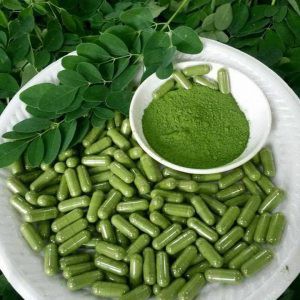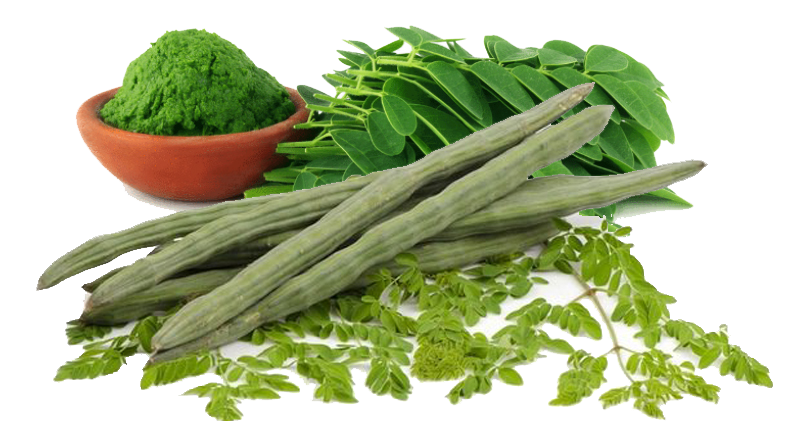Source: Thailand Medical News Jan 20, 2020 5 years, 8 months, 3 weeks, 5 days, 21 hours, 44 minutes ago
Moringa (
Moringa oleifera, or M. oleifera,
มะรุม) , also called
Marum in Thai, is mainly touted for its high concentration of antioxidants
, as well as its ability to lower blood sugar, improve heart health, and reduce inflammation as well as other health benefits.

Although still new to the West, this small tree,
moringa oleifera, has been highly valued for centuries in southeast Asia ie Thailand, Cambodia, Myanmar and South Asia ie India, where it is used in everything from fiber, rope, and dye, to fertilizer, spices and medicines.[1]
All parts of this plant are useful and edible, hence the name “miracle tree.” Other names it goes by include, horseradish tree, ben tree, and
drumstick tree. Whatever you call it,
moringa seeds, flowers, fruits, roots and leaves are all used for food, and each packed with phytonutrients, proteins and minerals. But the most potent nutritional content and healing properties come from the
moringa leaves. The leaves are edible raw and cooked, although in the West you’re most likely to find them dried and ground in powders or capsules.
The light-green colored, earthy-tasting powder is derived from the leaves and seed pods of
Moringa oleifera. According to a
review published in March 2014 in the journal Phytotherapy Research, the plant contains a number of important compounds, including beta-carotene, quercetin, and a wide range of vitamins and minerals.
Research from the U.S. Department of Agriculture (USDA) shows that one 10-gram (g) serving of moringa powder offers 150 milligrams (mg) of calcium (15 percent of the daily value, or DV), 2 mg of iron (11.11 percent DV), and 160 mg of potassium (3.4 percent DV). There is also protein content ie one 10-g serving of
moringa powder offers 3 g of protein.
As fresh moringa is tough to get in the United States and other western countries, many people are turning to the powdered form, and research suggests the powdered version may offer same health benefits as the fresh leaves.
The herb gets its superfood status from a rich nutrition profile, providing more nutrients per gram than many other plant species. The nutrient density of
moringa varies by growing conditions and preparation, but many studies rank
moringa with more vitamin C than oranges, more vitamin A than carrots, more potassium than bananas, and more iron than spinach.[2]Moringa is also high in protein, and contains an impressive 8 of the 9 essential amino acids, a rare trait in plant-based proteins.[3]
But incredible nutrient density isn’t the last of
trong>moringa’s claims to superfood fame. Its antimicrobial, anti-inflammatory, and antioxidant compounds help protect your performance and strengthen your body against a wide variety of diseases.
These are just some of the main health benefits of the plant leaves in dried powdered form.

1. Lowers Blood Sugar And Protects Against Diabetes
Able To Treat and prevent diabetes: Moringa leaf is a useful natural supplement for treating and preventing diabetes, and may even reverse type 1 and 2 diabetes in studies with rats.[4]
Regulates healthy blood sugar levels: In studies, moringa helps prevent sugar spikes after meals and reduces fasting blood sugar levels in both diabetic and non-diabetic animals.[5][6] Maintaining healthy blood sugar is key to reducing inflammation, boosting your mood, and preventing heart disease and diabetes. Other antioxidants in moringa help protect insulin-producing cells from damaging oxidative stress.[7]
Prevents problems associated with diabetes: The antioxidant phytochemicals in moringa leaves also help protect the kidney and retinas from diabetes-related damage, and studies show that moringa supplementation can help restore kidney and pancreas functions in diabetic rats.[8][9][10]
2. Lowers Inflammation And Oxidative Stress
Reduces inflammation: Moringa is a powerful anti-inflammatory agent, and helps soothe chronic inflammation in your body by suppressing inflammatory enzymes and boosting production of anti-inflammatory cytokines.[11] Reducing inflammation is the No. 1 goal of the Healthy Diet, and key to increasing your longevity, strength, and resilience to chronic diseases such as diabetes, arthritis, and obesity.
Reduces cellular oxidative stress and DNA damage: Moringa also boasts an impressive arsenal of antioxidants including vitamins C and E, flavonoids and polyphenols. These compounds scavenge harmful free radicals, and protect your cells from oxidative stress, DNA damage, and inflammation.[12]
Prevents putting on weight: Reducing blood sugar, inflammation, and oxidative stress can all help prevent unwanted weight gain.
3. Protects Against Viral, Fungal, And Bacterial Infections
Food poisoning: Several compounds in moringa are naturally antibacterial, antiviral, antifungal, and antiparasitic. This makes moringa useful in food preservation and water purification, and protecting you from nasty food-borne bugs like salmonella or fungi.
Herpes & HIV: These effects are so strong, that moringa is used as a promising treatment against herpes simplex virus and HIV.[13]
UTIs & stomach bugs: Incorporating moringa in your diet can help boost your resilience against blood or digestive bacterial infections.
Acne & Fungal infections : Moringa oils applied topically can fight fungal skin infections and acne.
4. Moringa Fights Cancer And Triggers Cell Death
Enhances cancer treatments: Moringa may play an exciting role in treating cancer, and enhancing cancer treatments such as chemotherapy. Moringa leaves pack a potent dose of antioxidants, compounds that ward off cancers by neutralizing free-radicals that can damage cells and DNA to trigger tumor development.[14]
Helps trigger cancer cell death: Studies show that specific moringa leaf extracts such as glucosinolates and quercetin help inhibit growth and trigger cell death in growing tumors.[15][16] Along with these exciting cancer-fighting properties, another study shows that treatment with moringa leaf extracts actually increased the effect of chemotherapy in human pancreatic cells.[17]
5. Prevents Cognitive Decline
A significant benefit of moringa’s high antioxidant content is its ability to protect your brain tissue against neurodegeneration and damage.[18] Moringa leaf extract may be valuable in treating memory-related disorders such as Alzheimer’s and dementia. In one rat study, treatment with moringa helped regulate and restore healthy neurotransmitter levels after Alzheimer’s-like brain damage.[19]
6. Protect Kidneys
Moringa is high in calcium oxalates, but not the kind of oxalates that cause kidney stones. Moringa calcium oxalates are non-soluble, which means your body can excrete them without worrying about kidney stones.[22]
7. Strengthens Skin And Hair
While moringa leaf helps you glow from the inside, moringa oils can boost your glow from the outside.
Hydrates skin: Pressed from seeds and leaves, this vitamin and antioxidant-rich oil makes an excellent skin cleanser, hydrating moisturizer or hair treatment.[23]
Prevents wrinkles & sagging skin: High vitamin C levels help boost natural collagen production and protect your skin from oxidative stress, fighting off wrinkles, sagging and sun damage.
Keeps skin clear: and its anti-inflammatory and antimicrobial properties can also help clear skin problems such as acne or blackheads.
Heals wounds: Moringa oil also helps heal wounds and skin damage by promoting the growth and movement of fibroblasts, the cells responsible for producing collagen in wound healing.[24]
8. Helps Treat Low-Iron Anemia
Moringa is an ideal iron supplement, and perfect for vegetarians who may need help hitting their iron and protein intake. On top of providing a potent plant-based iron, compounds in moringa actually improve iron absorption levels, increase red blood cell counts, and prevents the breakdown of red blood cells seen in sickle-cell anemia.[25][26]
9. It Can Balance Hormones
Menopause can throw women's hormones out of whack and make them feel out of whack, but moringa may help. A study published in the Journal of Food and Science Technology found that postmenopausal women who took a combination of moringa leaf powder and amaranth leaf powder for three months not only had decreased markers of oxidative stress, but they also had better fasting blood glucose and increased hemoglobin levels, which could mean more balanced hormones.
Moringa has also been linked to improved thyroid health, which controls hormones related to energy, sleep, and digestion.
10. It Protects The Liver.
Think of your liver as the body's detoxifier. It filters the blood, detoxifies chemicals, and metabolizes fat and moringa may help it work better. First off, moringa contains high concentrations of polyphenols to reverse oxidation in the liver, and preliminary research has shown moringa consumption to reduce liver fibrosis and protect against liver damage. Certain compounds present in moringa help to protect the liver against toxins or drug exposure.[20] Moringa’s high antioxidant content and ability to detoxify heavy metals make it an ideal supplement for supporting kidney and liver health.[21]
Moringa Side Effects
While moringa is generally safe and beneficial to add you your diet, it’s always a good idea to consult your doctor or functional health practitioner if you plan to use moringa to treat any specific disease.
This is especially true if you are trying to conceive, or taking other medications. Moringa (particularly extracts of the roots and bark) possess fertility-reducing properties that discourage implantation.[27] Not much research exists on the safety of moringa while pregnant, but moringa leaves have long been used as a traditional remedy to enhance breast milk production after giving birth.[28]
Be careful combining moringa with other medications that may that may mimic the same effects, such as blood sugar or blood pressure reducers, as moringa can add to these effects. Lastly, because moringa is such a rich source of iron, take care to avoid overdosing on this mineral.
How To Use Moringa
Moringa powder: In western countries, moringa leaves are dried and ground, sold as a powder or as supplements. You can add moringa powder to your smoothies or soups, or use it as a tea. It does have a mild asparagus-like flavor, so expect it to taste “healthy.”
Moringa dosage: Start out with 1/2 to 1 Tablespoon of moringa powder daily, or follow the recommendations on capsule supplements.
In high doses, moringa can have a laxative effect, so (like any supplement!) watch to see what changes you notice in your body.
Moringa oil: For cosmetic uses, creams or oils containing moringa seeds or moringa oil (also called ben oil or benzoil) can be great additions to your beauty routine. If you’re after pure moringa oil, look for organic and cold-pressed. Fortunately, moringa oil is highly resistant to oxidation, so you don’t need to worry about it going rancid before you finish the bottle. [29]
Additional Notes From Thailand Medical News : Assuming you’re not pregnant or breastfeeding, or taking medication for blood pressure, diabetes, or thyroid conditions, moringa powder is generally safe. That is, as long as you stick to the recommended doses listed on the package or bottle of moringa powder. “Too much of it could actually disrupt your digestive system."
But before you start taking moringa powder, figure out why you want to use it, and check in with your doctor or a registered dietitian to see if there are better options for you.
If you’re ready to take the plunge, be sure you’re buying moringa powder from a reputable brand that uses third-party testing for safety.
Finally, keep in mind that moringa powder and any other supplement isn’t a cure-all. “Natural products are really exciting, but we still need to look at our health very holistically, and while something like moringa might be able to support, it’s often not the only answer to someone’s health issues.”
Read Also: https://www.thailandmedical.news/articles/covid-19-herbs
and: https://www.thailandmedical.news/articles/covid-19-supplements
References:
[1] https://www.sciencedirect.com/science/articl...
[2] https://powerherbs.ca/wp-content/uploads/2016...
[3] https://www.researchgate.net/publication/328...
[4] https://www.sciencedirect.com/science/articl...
[5] https://www.tandfonline.com/doi/abs/10.3109/...
[6] https://www.ncbi.nlm.nih.gov/pubmed/19501271
[7] https://www.sciencedirect.com/science/articl...
[8] https://www.ncbi.nlm.nih.gov/pubmed/28333074
[9] https://www.ncbi.nlm.nih.gov/pubmed/23215831
[10] https://www.researchgate.net/publication/270...
[11] https://www.ncbi.nlm.nih.gov/pubmed/27013794
[12] https://www.ncbi.nlm.nih.gov/pmc/articles/PM...
[13] https://www.researchgate.net/publication/283...
[14] https://www.ncbi.nlm.nih.gov/pubmed/21148198
[15] https://www.ncbi.nlm.nih.gov/pubmed/11887749
[16] https://www.ncbi.nlm.nih.gov/pubmed/21385597
[17] https://www.ncbi.nlm.nih.gov/pubmed/23957955
[18] https://www.sciencedirect.com/science/articl...
[19] https://www.ncbi.nlm.nih.gov/pubmed/19246799
[20] https://www.ncbi.nlm.nih.gov/pmc/articles/PM...
[21] https://medcraveonline.com/OAJTMR/OAJTMR-02-...
[22] https://www.ncbi.nlm.nih.gov/pubmed/18335334
[23] https://www.ncbi.nlm.nih.gov/pmc/articles/PM...
[24] https://www.ncbi.nlm.nih.gov/pmc/articles/PM...
[25] https://jjbs.hu.edu.jo/files/v5n4/Paper%20Num...
[26] https://www.ncbi.nlm.nih.gov/pmc/articles/PM...
[27] https://www.tandfonline.com/doi/abs/10.3109/...
[28] https://www.wjpr.net/download/article/1470207...
[29] https://www.sciencedirect.com/science/articl...
Please help to donate to sustain our website and also for our various research ongoing projects.Your help in any amounts will help us as we are but a poor self-funded entity.https://www.thailandmedical.news/p/sponsorship

